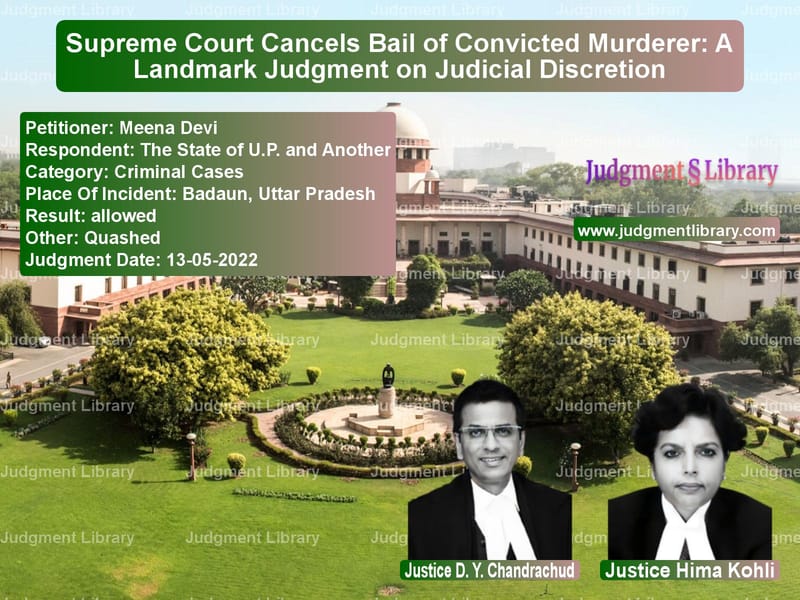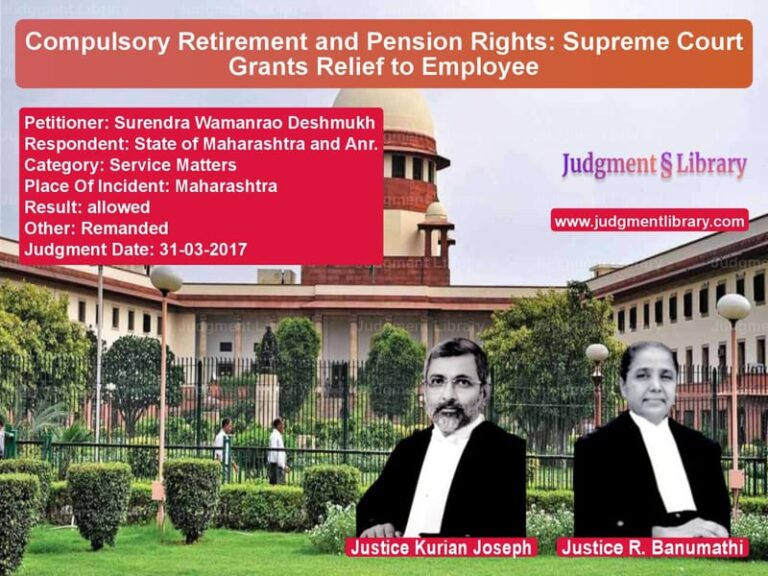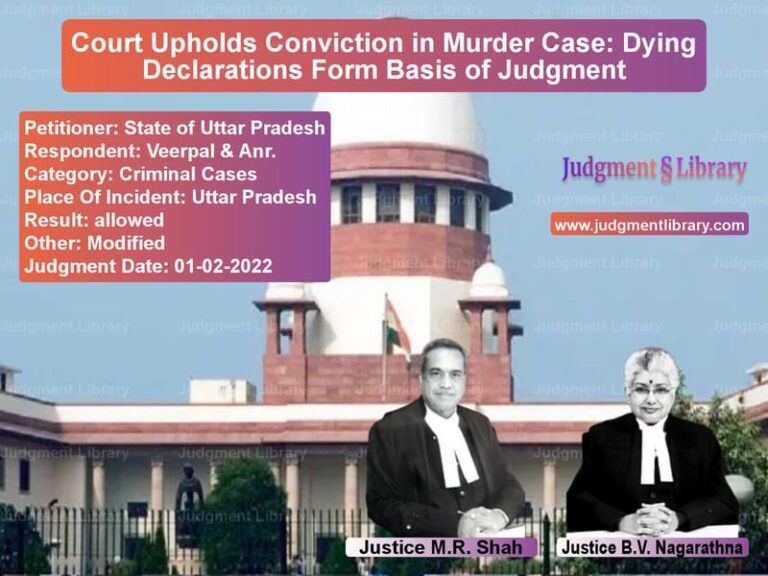Supreme Court Cancels Bail of Convicted Murderer: A Landmark Judgment on Judicial Discretion
The case of Meena Devi v. The State of U.P. and Another is a significant ruling by the Supreme Court concerning the discretionary power of courts in granting bail to convicted criminals. This case, which originated from a brutal murder and subsequent conviction, raised fundamental questions regarding bail jurisprudence, judicial accountability, and the rights of victims in the criminal justice system.
Meena Devi, the wife of the deceased Narain Singh, approached the Supreme Court, challenging the bail granted to Shivraj Singh alias Lalla Babu by the High Court of Allahabad. Shivraj Singh had been convicted of murder and sentenced to life imprisonment, yet he was granted bail by the High Court. The Supreme Court was thus tasked with determining whether the bail granted was justified or if it represented an arbitrary exercise of judicial discretion.
Background of the Case
The case revolves around the murder of Narain Singh on June 16, 2012. According to the FIR filed by his wife, Meena Devi, her husband was shot at point-blank range while returning home on a motorcycle. The attack was allegedly orchestrated by Shivraj Singh from jail, with the motive being an ongoing dispute over the ownership of Janta Junior High School. The victim had previously been a key witness in an abduction case against the respondent.
The prosecution argued that this murder was a premeditated act, planned meticulously while the respondent was still incarcerated. The trial court found the respondent guilty under Section 302 read with Sections 149 and 120B of the IPC and sentenced him to life imprisonment. However, despite his conviction, the High Court granted him bail, which was later challenged in the Supreme Court.
High Court’s Reasoning for Granting Bail
While granting bail to the convicted respondent, the High Court noted that:
- He had not misused bail during the trial.
- The only role assigned to him was of hatching a conspiracy.
- The letter used to prove his involvement in the crime was merely a photocopy.
However, these reasons were strongly contested by the appellant, who argued that the High Court had overlooked the gravity of the offense and the respondent’s extensive criminal history.
Arguments by the Appellant
The appellant’s counsel, Ms. Abha R. Sharma, strongly opposed the bail granted to the respondent, citing multiple grounds:
- The trial court had already convicted the respondent based on substantial evidence.
- He had a history of 37 criminal cases, including abduction and murder.
- Even after his conviction, he continued threatening key witnesses.
- Granting him bail posed a serious risk to public safety and the criminal justice system.
State’s Opposition to Bail
The State of Uttar Pradesh also opposed the bail, highlighting:
- The respondent was a hardened criminal, posing a serious threat to witnesses.
- His bail application had previously been rejected in multiple cases.
- The High Court’s order lacked proper reasoning and failed to consider relevant legal precedents.
Supreme Court’s Legal Analysis
The Supreme Court examined whether the High Court had exercised its discretion in accordance with established legal principles. The Court referred to several landmark rulings, including:
- Ram Govind Upadhyay v. Sudarshan Singh: Emphasized that bail in serious offenses must be granted with extreme caution.
- Mahipal v. Rajesh Kumar: Held that courts must provide clear and reasoned orders when granting bail in heinous crimes.
- Prasanta Kumar Sarkar v. Ashis Chatterjee: Outlined factors for granting bail, including the gravity of the offense and potential threats to witnesses.
The Court reiterated that judicial discretion in granting bail must be exercised judiciously and not arbitrarily.
Supreme Court’s Verdict
After reviewing the facts and legal principles, the Supreme Court set aside the bail order, directing the respondent to surrender immediately. The Court observed:
- The High Court had not provided adequate reasoning for granting bail.
- The respondent’s criminal history and potential threats to witnesses were ignored.
- Granting bail in such cases undermines the criminal justice system.
Impact of the Judgment
This ruling is a crucial precedent in criminal law, reaffirming that courts must carefully consider the gravity of the offense and the safety of witnesses before granting bail. It highlights the judiciary’s responsibility to balance individual liberty with the larger interest of society.
The judgment ensures that convicted criminals cannot exploit judicial leniency to evade justice. It also serves as a warning to courts to exercise their discretion responsibly and in line with established legal principles.
By reinforcing the importance of judicial accountability, the Supreme Court has taken a significant step toward ensuring a fair and robust legal system.
Petitioner Name: Meena Devi.Respondent Name: The State of U.P. and Another.Judgment By: Justice D. Y. Chandrachud, Justice Hima Kohli.Place Of Incident: Badaun, Uttar Pradesh.Judgment Date: 13-05-2022.
Don’t miss out on the full details! Download the complete judgment in PDF format below and gain valuable insights instantly!
Download Judgment: meena-devi-vs-the-state-of-u.p.-an-supreme-court-of-india-judgment-dated-13-05-2022.pdf
Directly Download Judgment: Directly download this Judgment
See all petitions in Bail and Anticipatory Bail
See all petitions in Murder Cases
See all petitions in Fraud and Forgery
See all petitions in Juvenile Justice
See all petitions in Custodial Deaths and Police Misconduct
See all petitions in Judgment by Dhananjaya Y Chandrachud
See all petitions in Judgment by Hima Kohli
See all petitions in allowed
See all petitions in Quashed
See all petitions in supreme court of India judgments May 2022
See all petitions in 2022 judgments
See all posts in Criminal Cases Category
See all allowed petitions in Criminal Cases Category
See all Dismissed petitions in Criminal Cases Category
See all partially allowed petitions in Criminal Cases Category






